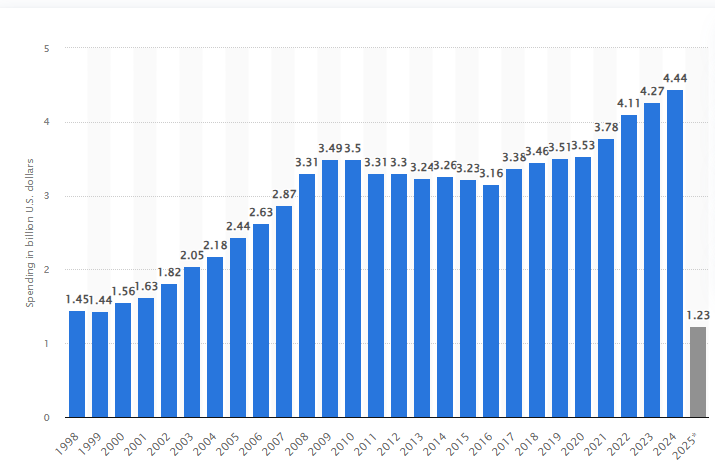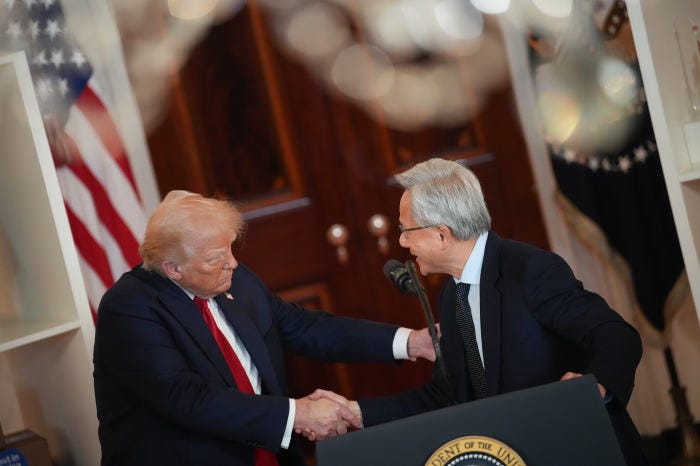O Capitalism, Where Art Thou?
Nvidia can sell chips in China again, yay to free trade?
If you find this article interesting, click the like button for me! I would greatly appreciate it :)
Companies are the powerhouse for economic growth, wages, and standards of living in the US. Open capital markets and some of the best companies in the world, the United States has seen very high economic growth for decades. Alongside record corporate profits, growth in something that may not sound like such a positive thing is corporate lobbying. Over time, corporations are lobbying the government more, with 2024 being a record year.

Capitalism is undoubtedly the reason for the strength of US companies and economic power. It may be human nature to think that some influence to steer things in a certain direction is beneficial. Contrary to what the majority of those disenfranchised with the world today think, capitalism is not the problem; corporatism is.
Corporatism, the theory and practice of organizing society into “corporations” subordinate to the state. - Britannica
Perhaps there is an important industry, such as aluminum or railroads, that the government might subsidize since everyone agrees we need more of that resource to make the country better. So it begins: companies lobby for their best interests to take advantage of what the government is willing to give them. They are seeking subsidies, tax breaks, and laws to ensure they are the ones selected for these special benefits from the state. The deterioration of capitalism is solidified when the government directly regulates/owns companies, picks winners and losers, and centrally plans vital industries. Welcome to crony capitalism, or more aptly named, corporatism (formally known as fascism when taken to its natural conclusion).
Fascism is a politically charged word that took on a whole new meaning after WWII. Even if you hate Trump, we aren’t there today. Where we are is a system of corporatism or crony capitalism that has invaded bipartisan policymaking in the US for decades. Many have noticed that corporations today do not care about the consumers and employees anymore. They are merely concerned with profits and valuation. Does this mean capitalism is broken and socialism is a better option?
Trump just announced a deal with Nvidia and AMD, which allows them to obtain an export control license to sell to China. In return, these companies will have to give 15% profits from chips sold to China to the federal government. This policy is unprecedented in the US and more akin to resource-rich developing countries that siphon profits of mineral exports. There are also questions about whether it is constitutional. It is essentially a tax on exports, which is not allowed under the current export legislation. However, given that it is conditional on an export control license, it is a gray area.
If you’re getting riled up one way or another, it is important to remember that Biden issued tariffs and subsidies for vital industries as well. Here, Trump has been even more into organizing the economy the way he sees fit through tariffs, trade deals, and now corporate influence. This may seem like a small price to pay to ensure the national security of important technology to a hostile economic power like China, but it is a slippery slope.
History
Over the years, capitalism/free markets have been sacrificed to achieve certain well-meaning means. In 1913, the Federal Reserve was created via a loophole that unconstitutionally created the US central bank. This cemented the Federal Government in control over the economy and people. Banks also had direct access to government money and stimulus. As such, they invested this “free money” into speculative assets. Everyone knows it’s easier to spend someone else’s money than your own. This contributed to the speculation and crash in 1929, the catalyst for the Great Depression.
Like normal, instead of solving the root cause that would limit their power, the government opted for a band-aid solution. In 1933, the Glass–Steagall legislation was passed, which separated commercial and investment banking. This was an effective solution, limiting banks’ ability to speculate on non-government securities like stocks and IPO’s. With heavy bank lobbying, this was repealed in 1999. It took like only a year for another speculative bubble, like the Great Depression, to pop once again. It took only 10 years for the greatest recession since the Great Depression, and many banks failed due to speculation in the housing market.
Instead of letting these banks go out of business that used these pernicious lobbying measures to allow them to take on excessive risk, the taxpayer was used to bail out these institutions deemed essential. Corporate greed and lobbying may seem like the issue, but it is the government policies fueling speculation and then subsequent bailouts that are the real problem.
In another attempt to rein in greedy corporations, which are the assumed problem, the Clinton administration passed laws to limit executive compensation through tax changes. Instead of paying executives less, the compensation switched from salaries to stock-based compensation. Share buybacks are marketed as a return of capital to the company, but have proven to be a method of boosting stock prices and selling shares to insiders. The government can’t stop corporate greed, but it can make the system more murky and fragile.
Implications
Biden isn’t a socialist, and Trump isn’t a fascist, but collectivism has been increasing under each president for the last century. Central planning of the economy is what makes bubbles and crashes worse, and too much can lead to authoritarian control even in free countries. The Nvidia/AMD profit-sharing arrangement may not sound like much, but it is yet another step towards government planning of the economy. It may sound necessary in today’s world, but we do not look back fondly on Italy’s revolving door with business or Germany’s state-controlled industries in the 1930s very fondly.
Trump won on a populist platform, but his economic policies are protectionist, similar to Biden's. Using federal laws, subsidies, or taxes to achieve its aims, the state isn’t serving the interests of the people, but itself. We may feel safer when the government does something for our national security, but who are we keeping secure, the individual or the state? 1930s Germany’s economic policy was largely driven by the notion that the individual has “not rights but only duties.”
Much of the blame for societal ills falls on capitalism and corporate greed, but it is misplaced. Further, the left/right divisiveness is really two sides of the same coin in terms of economic policy and federal power. Capitalism in the United States has devolved into corporatism with a long history of intervention, bailouts, and legislation. Today, it looks like the emergence of economic protectionism and the inklings of state-regulated industries. They say the future doesn’t repeat but often rhymes, so it is apt to take lessons from yesterday when weighing the implications of tomorrow. Until next week,
-Grayson
Socials
Twitter/X - @graysonhoteling
Archive - The Gray Area
Notes - The Gray Area
Promotions
Sign up for TradingView


